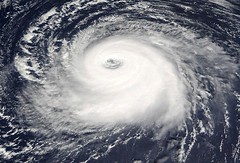 Each year researchers at North Carolina State University predict the oncoming hurricane season. With summer just around the corner for the Northern Hemisphere, their latest report is out, and it’s billing an active year for the Atlantic.
Each year researchers at North Carolina State University predict the oncoming hurricane season. With summer just around the corner for the Northern Hemisphere, their latest report is out, and it’s billing an active year for the Atlantic.
However, thankfully for those coastal cities on the Atlantic, the number of storms making landfall will stick close to the average.
Dr. Lian Xie is professor of marine, earth and atmospheric science at NC State, and along with graduate student Elinor Keith, the pair have predicted how the 2008 storm season will fall. Their results show that there is a possibility of 13 to 15 named storms forming in the Atlantic Basin (which includes the entire Atlantic Ocean, along with the Gulf of Mexico and the Caribbean Sea).
Of those storms though, only 6 or 8 may grow strong enough to be called hurricanes.
Geographically, the southeastern US coast could see 1 or 2 named storms make landfall, with a better than 50% chance that one of these storms will be a hurricane. The Gulf of Mexico – affecting those areas west of Miami, along the Mexican coast and south in to the Caribbean – is anticipated to see the most activity this year, with an indicated 2 – 4 storms, including one hurricane, likely to make landfall along the Gulf Coast.
Xie predictions come from an evaluation of data from the last 100 years of Atlantic Ocean hurricane positions and intensity. In addition, other variables including weather patterns and sea surface temperatures are used to predict how many storms will form and where they will make landfall.
Running between the first of June through to the end of November the Atlantic hurricane season has oft been the center of global warming proponents, pointing to a supposed increase in hurricanes as a result of warming sea temperatures. The debate is still out.
Jim47, what an arrogant post.
Insulting not just “NeoCons” (whatever YOU think they are) but Americans in their entirety. You could easily have made your point that the prediction was inaccurately stated in terms that made it sound more like a fact, than a guess.
And it is a guess, that’s the whole point.
I do wish that people would use words such as “likely”, “possibly” and “maybe” more of ten in these stories. Last year’s predictions were for a very active year, which did not happen; just what we needed, but not what we *needed*, if you catch my drift. The media might be more friendly to us than not, over-all, but making broad statements like the below just gives the NeoCons more fuel (pun intended) to attack us.
“However, thankfully for those coastal cities on the Atlantic, the number of storms making landfall will stick close to the average.”
Sticking the single word “probably” in between “will” and “stick” makes a dramatic difference in the point being made. *We* may know what you mean, but most Americans are not nearly well-educated enough to get the gist unless you use a 2×4 in the delivery.